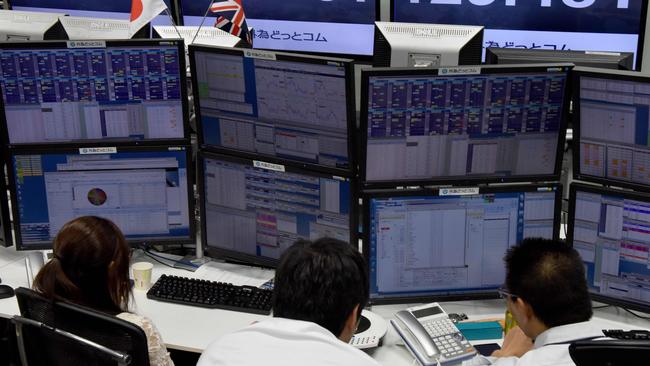Bank retreat has market on edge

In 2010, the US stockmarket fell more than nine per cent, briefly wiping off more than $US1 trillion of market value.
In 2015, the market in US treasuries gyrated, with yields tumbling and then spiking within a 37 basis point range within a 12-minute period.
Last year, US shares, responding to China’s unexpected devaluation, tumbled about 1.5 per cent before recovering almost all the gains a day later.
Earlier this year, South Africa’s Rand plummeted nine per cent in about a quarter of an hour while China’s stock market fell 10 per cent before bouncing back sharply, within the space of about a minute.
In the case of the pound there was a proximate cause, or at least a possible explanation, for the sell-off.
The week had started with the UK Prime Minister, Theresa May, announcing that her government would trigger the start of the Brexit process by the end of March next year.
By the end of the week, France’s president, Francois Hollande, was declaring that the UK would have to pay a price for leaving the EU and EU Commission president Jean-Claude Juncker urged European leaders to be “intransigent” in their negotiations with Britain.
The strengthening prospect of a “hard” Brexit and a hard-line stance from the Europeans by itself would have unsettled markets.
The specific trigger for the precipitous fall in the pound, just after 10am on Friday, as Asian markets were opening, is unclear at this stage, although the Bank of England has apparently asked the Bank for International Settlements to investigate the trading.
While early speculation of a “fat finger” trading mistake seems to have been dismissed, the scale and speed of the plunge does point to a familiar participant in the series of recent abrupt market implosions.
There’s little doubt that the rise and rise of automated trading in markets was a factor, with the relatively shallow levels of liquidity in Asian markets for the pound perhaps also contributing.
Automated trading, along with high-frequency trading, has been a factor cited in most of the flash crashes, given that a significant fall in a market triggers stop loss orders and results in a self-fuelling cascade of automated sales.
In the post-crisis environment, there are several factors that make markets more vulnerable to the algorithms that ignite a flash crash.
Banks and investment banks used to play the role of market-makers and liquidity providers during periods of volatility. Post-crisis banking reforms designed to strengthen banks’ capital and liquidity and reduce risk have, however, significantly reduced their roles in markets.
A PwC study last year concluded that there had been a measurable reduction in banks’ trading capacity and market liquidity since the crisis, with banks’ holdings of trading assets falling more than 40 per cent between 2008 and 2015.
As banks and investment banks have withdrawn from principal activity in markets, asset managers have grown in significance and financial markets have become increasingly interdependent as hedge funds and others have pursued returns wherever they have been available anywhere in the globe in an increasingly low-yield environment.
The International Monetary Fund has noted the increase in “shock transmission” around the globe and has said that increased surveillance of cross-border flows intermediated by asset managers is a priority.
It is conceivable that the larger role played by asset managers in financial markets exaggerates their volatility.
Fund managers tend to “crowd” into particular trades and trade in and out of them in a quite synchronised manner. Algorithmic trading can mean very rapid momentum develops — and liquidity evaporates — as the managers all head in the same direction.
There is concern among regulators that the post-crisis role of asset managers in global markets could generate systemic risks.
Conventional managers offer near-instant liquidity to investors but are exposed to underlying assets that could become quite illiquid during periods of market stress. Hedge funds use significant leverage to amplify their returns.
Diminished market liquidity heightens the funds’ sensitivity to risk, increasing volatility and, because of the herd-like qualities of asset managers, the risk of the kind of flash crash that hit the pound on Friday.
The post-crisis regulatory reforms have made banks somewhat safer and discouraged them from participating in some of the more risky activities they had previously pursued. They have pushed financial market risks away from the core of the global financial system, distributing it within non-banks and ultimately with the individuals whose money the asset managers manage.
The asset managers that are now a major force in financial markets don’t, however, perform the same roles that the banks and investment banks used to play. Rather than supporting markets and their liquidity during periods of market stress the asset managers drain liquidity and exacerbate volatility.
How that might impact a future financial crisis won’t be known until there is one. One suspects, however, that the impact won’t be positive for the managers’ end-investors and that there will inevitably be some broader systemic and economic consequences.






It would be easy to write off last Friday’s dramatic plunge in the pound as an isolated incident sparked by the increasingly tough talk from European leaders about the terms of the UK’s Brexit. “Flash crashes” like the 6.1 per cent dive in the value of the pound against the US dollar in Asia on Friday — in the space of a couple of minutes — appear, however, to be coming more frequently across a range of financial markets.